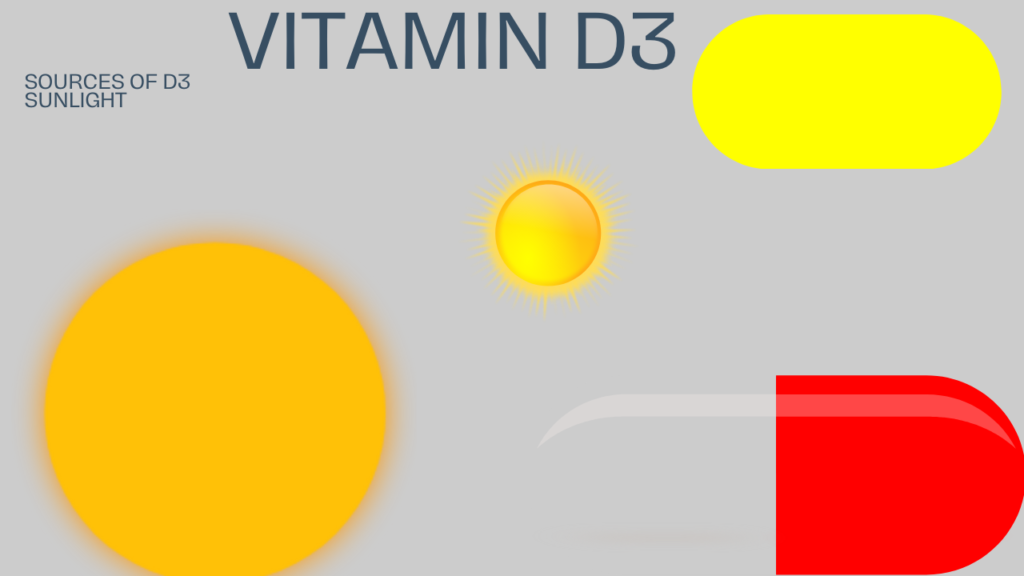Topic: Understanding Vitamin D3

Introduction: Known As Cholecalciferol, Is A Crucial Nutrient That Plays Various Roles In The Body. Unlike many other vitamins, Vitamin D can be synthesized by the body when the skin is exposed to sunlight. it Is Also Found In Some Foods And Can Be Taken As a Dietary Supplement.
Functions of Vitamin D3:
1. Bone Health: One of the primary functions of Vitamin D3 is to regulate calcium and phosphorus absorption, which is essential for maintaining healthy bones and teeth. It helps in bone mineralization and prevents conditions like rickets in children and osteomalacia in adults.
2. Immune Function: Vitamin D3 plays a role in modulating the immune system, helping to fight off infections and reduce inflammation. It is believed to enhance the innate immune response and regulate the adaptive immune system.
3. Muscle Function: Adequate levels of Vitamin D3 are important for muscle strength and function. Deficiency in Vitamin D3 has been linked to muscle weakness and increased risk of falls, particularly in older adults.
4. Cell Growth and Differentiation: Vitamin D3 is involved in regulating cell growth, proliferation, and differentiation. It has been studied for its potential role in preventing certain types of cancer, though more research is needed in this area.
Sources of Vitamin D3:
5. Sunlight: The body can synthesize Vitamin D3 when the skin is exposed to sunlight, particularly UVB radiation. However, factors such as geographic location, time of day, skin pigmentation, and sunscreen use can affect the production of Vitamin D3.
6. Dietary Sources: While few foods naturally contain Vitamin D3, some sources include fatty fish (such as salmon, mackerel, and tuna), egg yolks, and fortified foods like milk, orange juice, and cereals.
7. Supplements: Vitamin D3 supplements are available in various forms, including tablets, capsules, and liquid drops. They are often recommended for individuals who have limited sun exposure or inadequate dietary intake of Vitamin D3.
8. Vitamin D3 Deficiency:
Vitamin D3 deficiency is a common health concern, especially in regions with limited sunlight exposure and among certain populations, such as older adults, individuals with darker skin pigmentation, and those with certain medical conditions. Symptoms of deficiency may include bone pain, muscle weakness, increased susceptibility to infections, and mood disorders.
benefit of vitamin d3
Here are some of the key benefits associated with Vitamin D3:
9. Bone Health: One of the most well-known benefits of Vitamin D3 is its role in maintaining strong and healthy bones. It helps the body absorb calcium, which is essential for bone mineralization. Adequate Vitamin D3 levels can prevent conditions like rickets in children and osteomalacia in adults, which are characterized by weak and brittle bones.
10. Immune System Support: Vitamin D3 plays a crucial role in modulating the immune system. It helps the body fight off infections by enhancing the function of immune cells, such as T cells and macrophages. Research suggests that adequate levels of Vitamin D3 may reduce the risk of respiratory infections, autoimmune diseases, and other immune-related disorders.
11. Muscle Strength and Function: Vitamin D3 is important for maintaining muscle strength and function, especially in older adults. Adequate levels of Vitamin D3 have been associated with reduced risk of falls and fractures, as well as improved muscle performance and balance.
12. Mood Regulation: There is growing evidence suggesting a link between Vitamin D3 deficiency and mood disorders such as depression and seasonal affective disorder (SAD). Vitamin D receptors are found in areas of the brain involved in mood regulation, and some studies have shown that supplementation with Vitamin D3 may help improve mood and alleviate symptoms of depression.
13. Heart Health: Some research suggests that Vitamin D3 may have cardiovascular benefits, including reducing the risk of hypertension, heart disease, and stroke. Vitamin D3 may help regulate blood pressure, improve blood vessel function, and reduce inflammation, all of which contribute to overall heart health.
14. Cancer Prevention: While more research is needed, some studies have suggested that adequate Vitamin D3 levels may be associated with a reduced risk of certain types of cancer, including colorectal, breast, and prostate cancer. Vitamin D3 may inhibit the growth of cancer cells and promote apoptosis (cell death) in cancer cells.
15. Brain Health: Vitamin D3 receptors are also found in the brain, where they play a role in neuroprotection and cognitive function. Some research suggests that Vitamin D3 may help reduce the risk of neurodegenerative diseases like Alzheimer’s disease and improve cognitive function in older adults.
Conclusion:
Vitamin D3 is an essential nutrient with diverse functions in the body, including bone health, immune function, muscle strength, and cell regulation. While sunlight exposure is a primary source of Vitamin D3, dietary intake and supplementation may be necessary to maintain optimal levels, particularly in populations at risk of deficiency. Further research continues to explore the potential health benefits of Vitamin D3 and its role in preventing various diseases and conditions.






